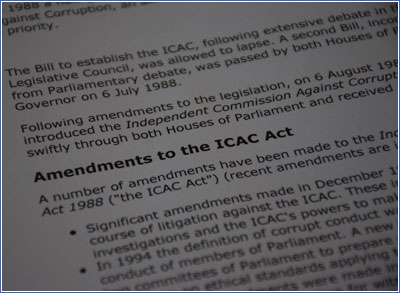
Corruption Matters - December 2015 | Issue 46
It’s business as usual for the ICAC
Four key changes were made to the Independent Commission Against Corruption Act 1988 in September 2015. In a few words, the purpose of these amendments is to (1) clarify the definition of corrupt conduct, (2) enhance the ICAC’s corruption prevention functions, (3) give the ICAC a new power to investigate specified criminal offences referred to it by the NSW Electoral Commission, and (4) limit the ICAC’s power to make findings of corrupt conduct to serious corrupt conduct.
Why did the NSW Parliament introduce these amendments?
How does the new section 8(2A) affect the ICAC’s jurisdiction?
Has the ICAC’s corruption prevention function been expanded?
Does the ICAC now have the power to conduct investigations into possible criminal offences involving election law?
What is serious corrupt conduct?
Reporting corrupt conduct

Why did the NSW Parliament introduce these amendments?
The High Court in ICAC v Cunneen (April 2015) found that, for the conduct of a non-public official to come within the definition of corrupt conduct in section 8(2) of the Independent Commission Against Corruption Act 1988 (“the ICAC Act”), it must be conduct that affects the “probity” as opposed to the “efficacy” of the exercise of official functions. This affected the ICAC’s jurisdiction to investigate the conduct of non-public officials.
In May 2015, NSW Premier the Hon Mike Baird MP charged former High Court Chief Justice Murray Gleeson and barrister Bruce McClintock SC to consider and report on the appropriate scope for the ICAC’s jurisdiction; whether the ICAC had appropriate powers and whether any limits should be applied to the exercise of those powers. The report of the Independent Review was released on 30 July 2015. The amendments, in turn, are a direct result of the report’s recommendations.
How does the new section 8(2A) affect the ICAC’s jurisdiction?
Under section 8(1), the ICAC has always had jurisdiction regarding allegations about the corrupt conduct of public officials and the conduct of non-public officials where that conduct affects the honest or impartial exercise of official functions. Section 8(2A) now provides that corrupt conduct is also the conduct of any person – whether or not a public official – that impairs, or that could impair, public confidence in public administration and which could involve:
- collusive tendering or
- fraud in obtaining a licence or permit under legislation designed to protect health and safety or the environment or the management and commercial exploitation of a resource or
- dishonestly obtaining or assisting in obtaining, or dishonestly benefiting from, the payment or application of public funds for private advantage or
- defrauding the public revenue or
- fraudulently obtaining or retaining employment as a public official.
Section 8(2A) is expected to increase the number of complaints to be assessed and investigated by the ICAC.
Has the ICAC’s corruption prevention function been expanded?
The Independent Review noted that the original version of section 13 of the ICAC Act unduly limited the ICAC’s advisory, educational and preventive functions to corrupt conduct. It proposed to “free [these] functions from constraints that accompany the investigative jurisdiction” by adding the function of “promoting the integrity and good repute of public administration” to each of the corruption prevention functions set out in section 13(1)(e) and 13(1)(f).
The amendment to section 13 enhances the ICAC’s power to examine wider government and administrative practices that allow corrupt conduct to develop.
Does the ICAC now have the power to conduct investigations into possible criminal offences involving election law?
Yes. In addition to its powers to investigate corrupt conduct, under the new section 13A, the ICAC now has the power to conduct criminal investigations regarding the offences specified in section 13A(9). Before it can do so, the NSW Electoral Commission must first refer the matter to the ICAC.
What is serious corrupt conduct?
Another new section of the ICAC Act, section 74BA, provides that the ICAC can only make findings of corrupt conduct if the conduct is serious corrupt conduct.
The report of the Independent Review states that the term “serious” should not be defined in the ICAC Act. It is not a limit on the ICAC’s jurisdiction and investigation powers. What is serious or not at the corrupt conduct findings stage of an investigation is something that can only be determined by the ICAC.
This change only applies to the ICAC’s ability to make corrupt conduct findings. It does not affect the ICAC’s jurisdiction. If a matter comes within the definition of corrupt conduct in the ICAC Act, then the matter can still be reported to the ICAC and the ICAC can still investigate, even if the ICAC ultimately determines that the conduct is not sufficiently serious to make a corrupt conduct finding.
Reporting corrupt conduct
If you are not sure whether a matter comes within the definition of corrupt conduct in the ICAC Act, you can contact the ICAC.
Members of the public, public officials and principal officers of public sector agencies should continue to notify the ICAC of suspected corrupt conduct in the usual way; that is, online on the ICAC website or by letter, telephone, fax or email using the details below. The ICAC also accepts enquiries and reports in person at its premises located at 255 Elizabeth Street, Sydney.
Postal address: PO Box 500, Sydney, NSW 2001 Australia
T: 02 8281 5999 or 1800 463 909 (for callers outside Sydney) or 02 8281 5773 (for hearing impaired callers only)
F: 02 9264 5364